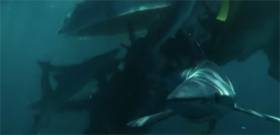Displaying items by tag: Celtic Deep
#MarineWildlife - Sharks have been filmed devouring a whale carcass at the ocean's surface in waters close to Britain and Ireland for the first time.
The results of the documentary expedition were broadcast last Friday as part of the UTV series Britain's Whales, available for catch-up the rest of this week.
As the Plymouth Herald reports, the groundbreaking experiment was headed by West Country marine biologist Dr Nicholas Higgs along with presenters Ellie Harrison and Ben Fogle, who sailed out to the Celtic Deep between Ireland, Cornwall and Wales with the carcass of a humpback whale in tow.
Their documentary crew were then able to film an "unprecedented" feeding frenzy by hundreds of blue sharks before the carcass was sunk for further study to examine the various creatures, from sharks to tiny 'zombie worms', that thrive on dead cetaceans as they drop to the ocean floor.
"I would never have predicted that you'd have this many sharks eating this much of the whale at the surface," said Dr Higgs. The Plymouth Herald has more on the story HERE.
In other cetacean news, Japan has disappointed global authorities by confirming hundreds of whale kills on its most recent expedition to the Antarctic.
Some 333 minke whales, including pregnant females, were poached between since December and last Friday (25 March), according to the Guardian.
As previously reported on Afloat.ie, Ireland recently joined an international demarche expressing "serious concern" at Japan's decision to resume whaling for what it claims are scientific purposes, claims that are not supported by the International Whaling Commission.
























































